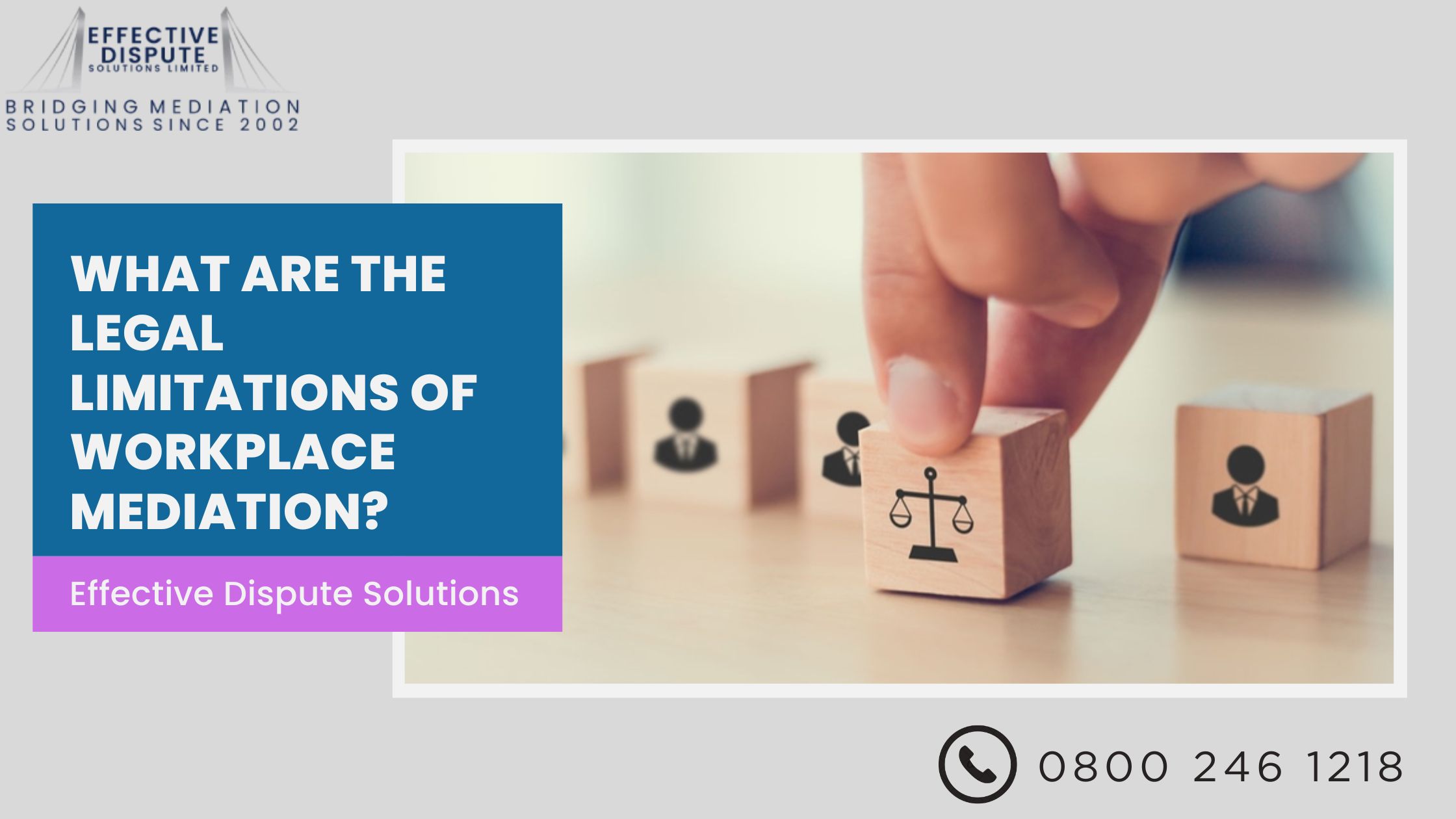Work can be really stressful, especially when there are problems. It might be hard to settle disagreements amongst coworkers, teams, or even management. That’s when workplace mediation comes in.
But here’s the thing: workplace mediation isn’t the same as civil or commercial mediation. Mediation is a good approach to settle disagreements at work, but not every agreement made during mediation is legally binding.
So, what are the legal limits of mediation at work? And why do we usually call it a “good faith” approach instead of a contract that is legally binding? Let’s make it easy to understand.
What is Mediation at Work?
In workplace mediation, a neutral third party helps settle disagreements at work. It is an effective tool to settle disagreements and arguments between employees at all levels.
The goal isn’t to penalise somebody or say who’s right or wrong. The mediator helps each employee to talk to each other honestly, so that they can reestablish trust, and find a solution that works for everyone. Some everyday situations include when coworkers disagree on how much work to do or how to talk to each other.
– Complaints regarding how management talks or acts.
– Claims of bullying or harassment that haven’t yet turned into formal complaints.
– Different ways that teams split up their work.
People talk about workplace mediation in these kinds of scenarios.
What Sets It Apart from Other Types of Mediation?
This is the main difference. In civil or commercial mediation, such as a contract dispute, the result is recorded in a legally enforceable agreement. If one side doesn’t follow through, the other side can take them to court.
Mediation at work, on the other hand, works differently. An agreement is not legally binding unless the employees want it to be. Instead, they depend on trust and understanding between each other. This strategy works well in the workplace because it helps people rebuild their relationships instead of turning every disagreement into a legal battle.
Key Legal Restrictions on Workplace Mediation
So, where do we stop? Let’s break it down into a few easy-to-understand points:
Not a contract that is legally binding in most work circumstances.
Even though workplace mediation can lead to a formal agreement, it doesn’t have the same power as a court order. Instead of a legally binding settlement, think of it as a plan that everyone agrees on.
Trust in good faith.
The employees engaged are required to keep their promises. But if one employee wishes to back out, the opposing side can’t make them do it subject to a court or tribunal action.
Not able to break the law of employment.
You can’t utilise mediation to go around your legal rights. For example, workplace agreements can’t let people give up their rights against unjust dismissal, discrimination under the Equality Act 2010, or protections for whistleblowers.
Not appropriate for every situation.
Some problems are just too severe for mediation, such as criminal matters, concerns about safety, or cases of violence. In those cases, mediation would not be suitable.
It depends on the culture of the organisation.
If the culture at work doesn’t support it, even the best-written agreement can fail. In contrast to contracts in a courtroom, compliance depends a lot on the confidence between workers and their bosses.
Why Are Workplace Agreements Not Binding?
You might be wondering why they aren’t binding like other kinds of mediation.
The solution has to do with the goal. Workplace mediation is more about improving communication than about getting legal remedies.
If every small fight between people went to court, businesses would be overrun with legal bills and paperwork. A flexible, good-faith approach lets people fix their working relationships without the fear of legal action hanging over their heads.
It is HR’s version of a peace treaty: strong because everyone agrees on it, but weak if trust breaks out later.
Pros: Even though there are limits
These agreements aren’t legally binding like contracts, yet they nonetheless have certain evident benefits:
- Resolve early: Before minor problems turn into tribunal cases, they get fixed.
- More trust: People feel heard and appreciated during the mediation process at work.
- Less stress: Colleagues can move on without having to worry about official complaints.
- Adaptability: Solutions are new and tailored to each situation, unlike the strict results of legal decisions.
When Is Mediation Not Enough?
Mediation has its benefits, but there are occasions when it just doesn’t work. Here are some common situations where its limits become clear:
- An employee keeps bullying another even though they promised to cease.
- One employee agreed, but then reneged – never actually meant to follow through, nor did they.
- There are formal legal problems, including unjust firing, pay disputes, or discrimination.
- Mediation will more than likely not work in these types of scenarios. Whereby the employer / company would have to use conventional HR processes or go through an employment tribunal.
HR Non-Binding Mediation: A Useful Tool
Keep in mind that HR non-binding mediation is still quite well thought of. A lot of employers like it because it lowers risk, raises morale, and stops conflicts from getting worse. Plus when you do the maths, it really is cost effective.
Workplace mediation will cost an employer only up to a tenth or below of defending an employment tribunal claim. That’s a whopping saving of 90%!
One solicitor said, “When employees reach an agreement in mediation, they’re much more likely to stick to it than if a decision is forced upon them.”
So, these agreements are nevertheless important, even though they don’t have the power of law. The commitment comes from trust and the culture at work, not from the justice system.
Advice for successful mediation at work
Here are some ways to make mediation work better, even though it has some legal limits:
- Get ready: Before you start talking, think about what you want to happen.
- Be open: Being honest about your worries is essential for the procedure to work.
- Look ahead: Instead of going over old mistakes, think about what needs to improve in the future.
- Write it down: Having a detailed written record can help hold people accountable, even if it can’t be enforced.
- Get in touch with HR: HR can help make sure that the actions agreed upon in mediation are being followed.
FAQs
Is mediation at work legally binding?
Not usually. Workplace results rely on trust and good faith instead of legal enforcement, which is different from other types of mediation.
Is workplace mediation a substitute for an employment tribunal?
No. Tribunals are still needed for serious employment matters. Mediation works best for settling arguments that have to do with relationships.
What happens if someone breaks a workplace mediation agreement?
There is no direct legal enforcement. Most of the time, the problem will go back to HR. However, imagine having to face your employer, management, after breaking a workplace agreement? A mediation which the company paid for, there would surely be a very uncomfortable conversation to be had.
Equally there is always the threat of dismissal, this of course would only happen in extreme cases, where an employee was on a final written warning, but it could happen.
Conclusion
In conclusion, know the limits and use them wisely. Mediation at work is a valuable tool, but it won’t fix everything. Its results depend on mutual respect, not on the law. This is both its worst problem and its biggest strength.
If you understand this from the start, you’ll know when to use mediation and when to take things to the next level. Use it to create trust, encourage honest conversation, and keep disagreements from turning into costly court cases.
Effective Dispute Solutions has decades of experience that show workplace mediation can change relationships for the better when both sides are willing. It won’t replace every legal option, but it typically gives people what they need at work: comprehension, clarity, and a new beginning.


